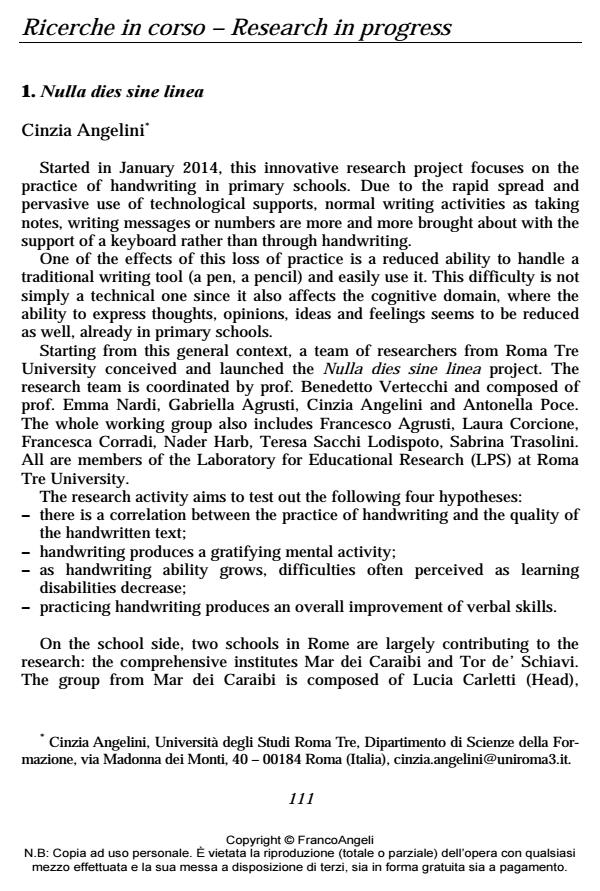Ricerche in corso
Titolo Rivista CADMO
Autori/Curatori A cura della Redazione
Anno di pubblicazione 2014 Fascicolo 2014/1 Lingua Italiano
Numero pagine 9 P. 111-119 Dimensione file 34 KB
DOI 10.3280/CAD2014-001010
Il DOI è il codice a barre della proprietà intellettuale: per saperne di più
clicca qui
Qui sotto puoi vedere in anteprima la prima pagina di questo articolo.
Se questo articolo ti interessa, lo puoi acquistare (e scaricare in formato pdf) seguendo le facili indicazioni per acquistare il download credit. Acquista Download Credits per scaricare questo Articolo in formato PDF

FrancoAngeli è membro della Publishers International Linking Association, Inc (PILA)associazione indipendente e non profit per facilitare (attraverso i servizi tecnologici implementati da CrossRef.org) l’accesso degli studiosi ai contenuti digitali nelle pubblicazioni professionali e scientifiche
- Myers, J. (2012), “Texting Affects Ability to interpret Words”, Utoday, https://www.ucalgary.ca/news/utoday/february17-2012/texting, u.a. 15.04.2014.
- Anderson, J., Rainie, L. (2013), “Millennials Will Benefit and Suffer Due to Their Hyperconnected Lives”, Pew Internet & American Life Project report, February, http://pewinternet.org/Reports/2012/Hyperconnected-lives.aspx, u.a. 15.04.2014.
- Cingle, D., Sundar S. (2012), “Texting, Techspeak, and Tweens: The Relationship between Text Messaging and English Grammar Skills”, New Media & Society, May 11, http://nms.sagepub.com/content/early/2012/05/10/1461444812442927, u.a. 15.04.2014.
- Cotroneo, R. (2014), “Il trapassato remoto? Archiviato”, Sette-Corriere della Sera, 28/3/2014.
- Cristal, D. (2001), Language and the Internet. Cambridge (UK): OUP.
- Fang-Yi, F., Wang, K., Klausner, M. (2013), “Rethinking Students’ Self Regulation and Sustained Attention: Does Text messaging during Class Influence Cognitive learning?”, Communication Education, 4 April, http://thomas-hersey.wiki.uml.edu/file/view/Rethinking_College_Student’s_Self-Regulation.pdf, u.a. 15.04.2014.
- Henry, J. (2013), Art of Essay Writing Damaged by Twitter and Facebook, 20 January, http://www.telegraph.co.uk/technology/social-media/9813109/Art-of-essay-writingdamaged-by-Twitter-and-Facebook-Cambridge-don-warns.html, u.a. 15.04.2014.
- Junco, R. (2011), “Too Much Face and not Enough Books: the Relationship between Multiple Indices of Facebook Use and Academic Performance”, Computers in Human Behaviour, 28, 1, pp. 187-198.
- Junco, R., Cotten, S.R. (2012), “No A 4 U: The Relationship between Multitasking and Academic Performance”, Computers & Education, 59, 2, September, pp. 505-514, http://dx.doi.org/10.1016/j.compedu.2011.12.023, u.a. 27.11.2013.
- Kirschner, P., Karpinski, A. (2010), “Facebook and Academic Performance”, Computers in Human Behavior, 26, 6, November, pp. 1237-1245, http://dx.doi.org/10.1016/j.chb.2010.03.024, u.a. 15.04.2014.
- Longcamp, M., Boucard, C., Gilhodes, J.C., Anton, J.L., Roth, M., Nazarian B. et al. (2008), “Learning through Hand or Typewriting Influences Visual Recognition of New Graphic Shapes: Behavioural and Functional Imaging Evidence”, Journal of Cognitive Neuroscience, 20, pp. 802-815. Longcamp, M., Hlushchuk, Y., Hari, R. (2011), “What differs in Visual Recognition of Handwritten vs Printed Letters? An FMRI Study”, Human Brain Mapping, 32, pp. 1250-1259.
- Ritchel, M. (2011), A Silicon Valley School That Doesn’t Compute, 22 October, http://www.nytimes.com/2011/10/23/technology/at-waldorf-school-in-silicon-valley-technology-canwait.
- html?pagewanted=all&_r=0, u.a. 15.04.2014.
- Rosen, L.D., Carrier, L., Cheever, N.A. (2013), “Facebook and Texting Made Me Do it: Media-induced Task-switching while Studying”, Computers in Human Behavior, pp. 948-958, http://dx.doi.org/10.1016/j.chb.2012.12.001, u.a. 27/11/2013.
- Spitzer, M. (2013), “To Swipe or not to Swipe? The Question in Present-day Education”, Trends in Neuroscience and Education, http://www.sciencedirect. com/science/journal/22119493, u.a. 22.04.2014.
- Suto, I. (2012), “What are the Impacts of Qualifications for 16 to 19 Year Olds on Higher Education? A Survey of 633 University Lecturers”, Cambridge Assessment, April, http://www.cambridgeassessment.org.uk/images/116010-cambridge-assessment-heresearch-survey-of-lecturers-executive-summary.pdf.
- Tan, LH., Xu, M., Chang, C.Q., Siok, W.T. (2013), “China’s Language Input System in the Digital Age Affects Children’s Reading Development”, Proceedings of the National Academy of Sciences, 111, pp. 1119-1123.
- Truong, K. (2010), “Student Smartphones Use Doubles: Instant Messaging Loses Favour”, in The Higher Education Chronicle, 17 June, http://chronicle.com/blogs/ wiredcampus/studentsmartphone-use-doubles-instant-messaging-loses-favor/24876, u.a. 15.04.2014.
- Vertecchi, B. (2014), “Interrogantibus libenter respondeat”, 4 aprile, http:// minimaeducationis.wordpress.com/author/benever/, u.a. 22.04.2014.
A cura della Redazione, Ricerche in corso in "CADMO" 1/2014, pp 111-119, DOI: 10.3280/CAD2014-001010